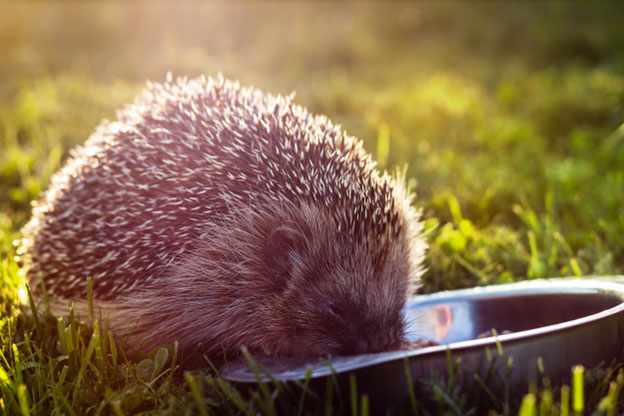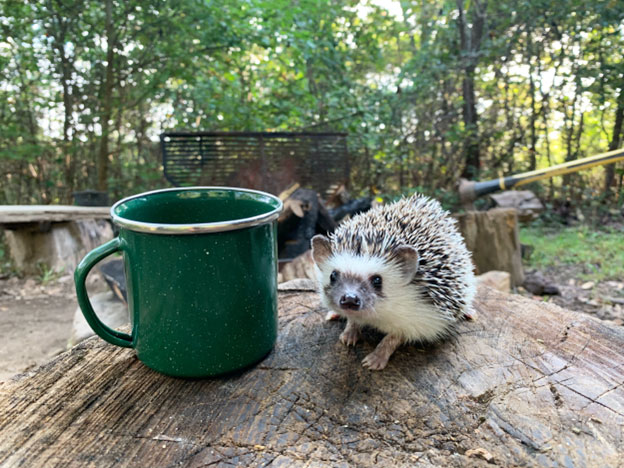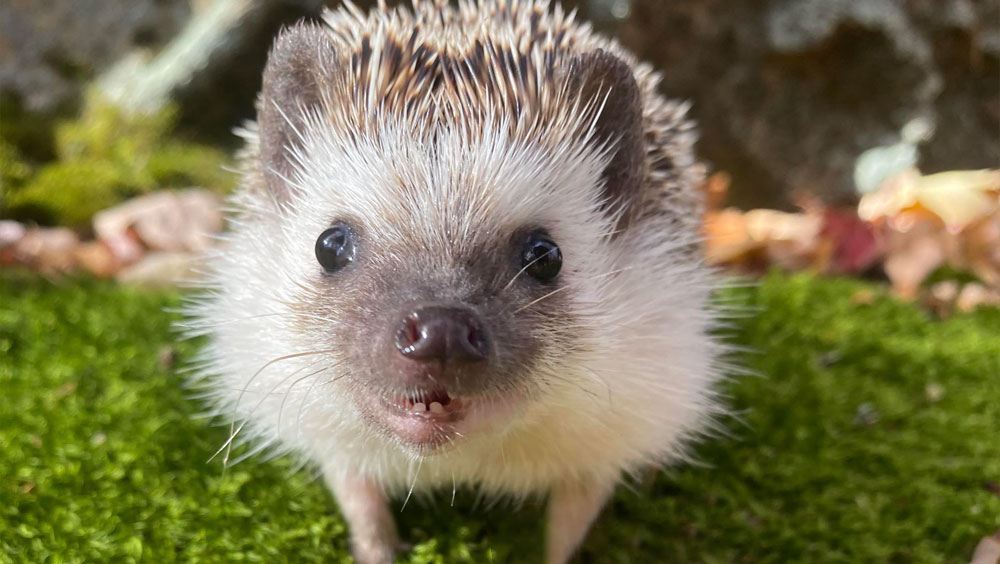Hedgehogs are one of the most popular pets in the world. And many people want to know how long hedgehogs live. Although some hedgehogs can easily reach the age of 10 years or more, on average, these small and spiky mammals typically only have a lifespan of around 4-6 years when living in captivity. In the wild, their lifespan is much shorter due to predation and other factors.

Average Lifespan of Hedgehogs
Hedgehogs, those adorable and prickly little creatures, have captured the hearts of many animal lovers around the world. Known for their unique appearance and quirky behavior, hedgehogs are increasingly becoming popular as pets. One of the primary concerns for hedgehog owners is how long these delightful creatures will live. In this article, we will explore the average hedgehog lifespan and provide some tips on how to ensure a happy and healthy life for your spiky companion.
Lifespan Range for Different Hedgehog Species
African Pygmy hedgehogs, the most common domesticated hedgehog species, typically have a lifespan of around 4-6 years. However, with proper care and a healthy diet, some individuals have been known to live up to 8 years or even longer.
European hedgehogs, found in the wild in Europe, have a shorter average lifespan of 2-3 years. This is primarily due to their exposure to predators, limited food sources, and risks like road traffic accidents.
Other hedgehog species, such as the Four-toed hedgehog and Long-eared hedgehog, have similar average lifespans to the African Pygmy hedgehog.
Factors That Influence Hedgehog Longevity
Genetics plays a significant role in a hedgehog's lifespan. Some hedgehogs may have a genetic predisposition for certain health issues, such as heart disease or wobbly hedgehog syndrome, which can affect their lifespan. Responsible breeders can help minimize these genetic risks through selective breeding.
Diet is another crucial factor. A healthy diet consists of a balance of high-quality dry foods, supplemented with occasional treats like insects or fruits. Providing the correct nutrients ensures hedgehogs maintain a healthy weight and avoid conditions related to obesity.
The habitat also plays a vital role in a hedgehog's lifespan. Creating a suitable environment with hiding spots, proper bedding (avoiding wood shavings, which can harm their feet), and mental stimulation toys promotes their overall well-being and longevity.
Proper care is essential to ensure a hedgehog's health. Regular veterinary check-ups can detect and address potential health issues early on. External parasites, fungal infections, and dental problems are common risks that need to be monitored. Exercise wheels and PVC pipes can provide physical activity, while annual vaccinations can protect against diseases.
Caring for a Hedgehog to Promote Longevity
Regular veterinary check-ups are crucial for the early detection and prevention of any potential health issues. Find a veterinarian experienced in exotic pet care who can provide annual check-ups and vaccinations. Hedgehogs are prone to external parasites like mites, as well as dental problems and fungal infections. Regular check-ups can help ensure any health concerns are addressed promptly.

Physical activity is essential for a hedgehog's overall well-being and longevity. Provide them with an exercise wheel to help them burn off excess energy and maintain a healthy weight. Exercise wheels designed specifically for hedgehogs are a safer option, as they prevent any injuries that can occur with standard hamster wheels. PVC pipes or tunnels are another great options for them to explore and get exercise.
To ensure your hedgehog lives a happy and stress-free life, it's essential to provide them with mental stimulation. Hedgehogs are intelligent creatures that benefit from interactive toys and activities. Puzzle feeders or treat dispensers can keep them mentally engaged while satisfying their natural foraging instincts.
Finally, consider the quality of life for your hedgehog. Provide a comfortable and quiet environment, away from noisy areas of your home. Hedgehogs are light sleepers, and a calm environment will help them get the rest they need. Avoid exposing them to excessive light during their sleeping hours, as it can disrupt their natural sleep cycle.
Providing a Proper Diet
Hedgehogs are insectivores, so their diet should primarily consist of high-quality commercial hedgehog food. These specially formulated dry foods are designed to meet their nutritional needs, containing essential vitamins, minerals, and proteins.
However, to add variety and enrichment to their diet, you can also supplement their meals with appropriate treats and fresh foods. Small insects like crickets or mealworms can be offered as occasional treats, providing them with additional protein. Fruits such as apples, berries, or melons can also be introduced in small amounts for added nutrition and enrichment.
Importantly, avoid feeding hedgehogs foods that are toxic to them, such as chocolate, onions, or grapes. These can have severe consequences on their health and should be strictly eliminated from their diet.
Remember to provide a fresh supply of clean water daily, ensuring it is easily accessible for your hedgehog at all times.
Creating an Enriching Habitat
Firstly, hedgehogs require a spacious cage to allow for exercise and exploration. A minimum size of 2 feet by 3 feet is recommended, with plenty of room for them to move around comfortably.
Next, choose suitable bedding for the cage. Avoid using cedar or pine shavings as they can be harmful to hedgehogs. Instead, opt for paper-based bedding or fleece liners that are safe and comfortable for them.
Providing hiding spots is essential to help hedgehogs feel secure. You can use tunnels, hiding caves, or even PVC pipes for them to retreat into when they need privacy or relaxation.
Toys and enrichment items play a significant role in a hedgehog's mental and physical stimulation. Offer items such as exercise wheels, tunnels, and puzzle feeders to keep them entertained and active.
Regularly rotate and introduce new toys to prevent boredom. Hedgehogs are curious creatures, so providing an enriching environment will ensure they remain happy and engaged.

In conclusion, creating an enriching habitat for hedgehogs involves providing a spacious cage, suitable bedding, hiding spots, and a variety of toys. This will enhance their mental and physical well-being, leading to a happier and healthier pet hedgehog.
Regular Veterinary Care
Regular veterinary care is crucial for the health and well-being of hedgehogs. Annual check-ups are recommended to monitor their overall health and catch any potential issues early on. Hedgehogs are prone to certain health problems such as heart disease, fungal infections, and wobbly hedgehog syndrome.
A knowledgeable veterinarian can provide guidance on proper diet, ensure the hedgehog is receiving the necessary nutrients, and offer advice on maintaining a healthy weight. They can also identify any signs of disease or illness that may not be immediately apparent to the owner.
Regular veterinary care also includes preventive measures such as vaccinations and parasite control. External parasites like mites can cause discomfort and health issues if left untreated, so routine check-ups and appropriate treatment are essential.
In case of any health concerns, it is crucial to seek immediate medical attention. Hedgehogs are known to be "light sleepers" and may not show obvious signs of illness until the condition has progressed. Early intervention can greatly improve the chances of a positive outcome.
Conclusion
In conclusion, hedgehogs have a wide range of lifespans depending on various factors. On average, hedgehogs can live up to 4-7 years, with some reaching 10 years or more with proper care. Providing the right environment, diet, and healthcare is crucial for ensuring a healthy and happy life for these adorable creatures.
Pet hedgehog owners should prioritize their pets' well-being by offering a suitable habitat with ample space, hiding spots, and an exercise wheel for physical activity. A balanced diet, recommended by a veterinarian, is essential to meet their nutritional needs. Fresh water, high-quality dry foods, and occasional treats can contribute to a hedgehog's overall health.

Regular check-ups with a knowledgeable veterinarian are vital to monitor and address any health concerns. Preventive measures like vaccinations and parasite control should be part of the routine care.
Owners should also keep an eye out for signs of illness or discomfort, even if hedgehogs are known to be light sleepers. Early intervention can make a significant difference in their quality of life. Providing a safe and stimulating environment, along with love and attention, will ensure that pet hedgehogs live their best possible lives.
Frequently Asked Questions:
Here are some frequently asked questions about the life expectancy of hedgehogs:
What is the average lifespan of a pet hedgehog?
Pet hedgehogs typically live between 4 and 6 years in captivity, although some can live up to 8 years with proper care.
Can hedgehogs live longer in captivity compared to the wild?
Yes, a hedgehog generally has a longer lifespan in captivity compared to a wild hedgehog. The average lifespan of wild hedgehogs, such as the European hedgehog, is around 2-3 years due to various predators and environmental factors.
How can I help my hedgehog live a long and healthy life?
To help your hedgehog live a long and healthy life, provide them with a spacious and enriched habitat. Offer a balanced diet consisting of high-quality dry foods, fresh water, and occasional treats. Regular exercise, mental stimulation, and social interaction are also important.
Are there any specific health issues that may affect a hedgehog's lifespan?
Hedgehogs are prone to certain health issues that can affect their lifespan. These include heart disease, fungal infections, wobbly hedgehog syndrome, and complications related to obesity. Regular veterinary check-ups, preventive care, and a healthy diet can help minimize these risks.
How can I tell if my hedgehog is in good health?
To determine if your hedgehog is in good health, pay attention to their eating habits, activity levels, and overall appearance. A healthy hedgehog should have bright and clear eyes, clean ears, and dry feet. They should be active, alert, and have a healthy weight. Any noticeable changes or concerns should be addressed with veterinary attention.


